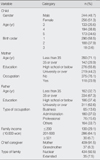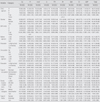Abstract
Purpose
This study was done to identify the relationship between goodness-of-fit for mother-preschool child dyads and parenting stress experienced by the mother.
Methods
Study participants were 500 mothers who had children aged 3 to 5 who attended one of ten kindergartens or infant schools in M City or B City. Descriptive statistics and Pearson's correlation coefficients were calculated using the SPSS program.
Results
Comparison of goodness-of-fit scores for mother-preschool child dyad according to the characteristics of the participants, showed a significant difference according to child's age, gender, and birth order, mother's education and occupation, father's age and education, family income, and the chief caregiver in the family. There was a positive correlation between goodness-of-fit scores for mother-child dyad and parenting stress scores for mothers.
Conclusion
The findings of the study indicate a need to identify differences between children's behavioral problems and parenting styles according to the degree of discord in the mother-child temperaments. It is also necessary to develop and apply nursing programs to promote harmonizing of temperaments, programs in which the characteristics of the child and the mother are considered.
Figures and Tables
References
1. Abidin RR. Parenting stress index (PSI). 1990. Charlottesville, VA: Pediatric Psychology Press.
2. Ahn MS. Effects of a maternal education program based on the temperament theory on the temperamental goodness-of-fit between mother and child. Journal of Korean Academy of Nursing. 2005. 35:1044–1053.
3. Bae KS. Infant's temperament and self-esteem: Test of a "goodness of fit" model. 2004. Busan: Pusan National University;Unpublished master's thesis.
4. Bang KS. Child rearing attitude and burden of employed and unemployed mothers and temperament and health related variables of their preschool children. Journal of Korean Academy of Child Health Nursing. 2004. 10:217–224.
5. Brent AM, Sarah JS, Thomas RR. Child characteristics, parenting stress, and parental involvement: Fathers versus mothers. Journal of Marriage and Family. 2002. 64:998–1011.
6. Buss AH, Plomin R. A temperament theory of personality development. 1975. New York, NY: Wiley.
7. Chess S, Thomas A. Goodness of fit: Clinical application from infancy through adult life. 1999. Philadelphia, PA: Brunner/Mazel.
8. Choi SW. The relationship between mother's rearing attitude and mother perceived child problem behaviors. 2005. Daejon: Chungnam National University;Unpublished master's thesis.
9. Crinic KA, Booth CL. Mother's and father's perceptions of daily hassles of parenting across early childhood. Journal of Marriage and the Family. 1991. 53:1042–1050.
10. Crinic KA, Greenberg MT. Minor parenting stresses with young children. Child Development. 1990. 61:1628–1637.
11. Dumas JE, LaFreniere PJ. Mother-child relationships as source of support or stress: A comparison of competent, average, aggressive, and anxious dyads. Child Development. 1993. 64:1732–1754.
12. Hockenberry MJ, Winkelstein W. Wong's essentials of pediatric nursing. 2004. New York, NY: Mosby.
13. Hong KO. Relationships between kindergarteners' patterns of attachment and their temperament and their mothers' parenting behavior. 1994. Seoul: Korea University;Unpublished doctoral dissertation.
14. Jung JY. A study on the parenting stress of mother: Relations to the mother perception of child behavior problem and the mother-child's goodness of fit. 2002. Seoul: Kyung Hee University;Unpublished master's thesis.
15. Jung YA. Parenting stress of preschool children's fathers and mothers. 2004. Seoul: Chung-Ang University;Unpublished master's thesis.
16. Kim JM, Yoon G. The effects of temperamental goodness-of-fit on depressive symptoms in adolescents. The Korean Journal of Development Psychology. 1992. 5:55–72.
17. Kim HM. The relations of maternal parenting stress, parenting efficacy, and parenting behavior to children's social competence. 2004. Seoul: Ewha Womans University;Unpublished master's thesis.
18. Kim HS, Oh KS, Shin YH, Kim TI, Yoo HN, Sim MK, et al. Factors influencing parenting stress in primiparas. Journal of Korean Academy of Child Health Nursing. 2005. 11:290–300.
19. Kim HS, Sim MK, Kim TI, Kathleen NF, Rosemary White-Traut C, Carole KA. Factors influencing parenting confidence in first-time mothers of infants in their first year. Journal of Korean Academy of Child Health Nursing. 2007. 13:119–127.
20. Kwon MK, Kim HW, Kim NS, Jang JA. Postpartum depression and maternal role confidence parenting stress, and infant temperament in mothers of young infants. Journal of Korean Academy of Child Health Nursing. 2006. 12:314–321.
21. Lee YS, Seo SJ. Preschoolers' adjustment behavior-Focusing on the socio-demographic variables of children and their mothers, children's temperament and mother's parenting attitudes. Journal of the Korean Home Economics Association. 2006. 44:143–155.
22. Lee YY. The effect of father's involvement in child rearing and mother's parenting stress on marital relationship. 2007. Seoul: Sookmyung Women's University;Unpublished master's thesis.
23. Lerner JV. The role of temperament in psychological adaptation in early adolescents: A test of a goodness of fit model. Journal of Genetic Psychology. 1983. 44:143–155.
24. Luster T, Okagaki L. Parenting: An ecological perspective. 1993. Hillsdale, MI: Lawrence Erlbaum Associates.
25. Moon CN. The relation between mother-child's goodness-of-fit and mother's parenting stress. 2004. Cheongwon: Korea National University of Education;Unpublished master's thesis.
26. Nam HS. A difference of parenting stress dependant on children's temperament perceived by their mothers. 2003. Daegu: Unpublished master's thesis.
27. Park SY, Rim MR. Working mother's parenting behavior as related to job characteristics, day care quality, and psychological well-being. Journal of Korean Home Management Association. 2002. 20:57–68.
28. Thomas A, Chess S. Temperament and development. 1977. New York, NY: Bruuner/Mazel.




 PDF
PDF ePub
ePub Citation
Citation Print
Print







 XML Download
XML Download